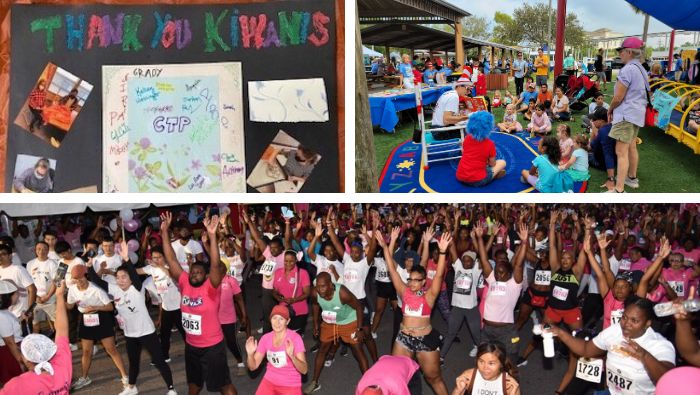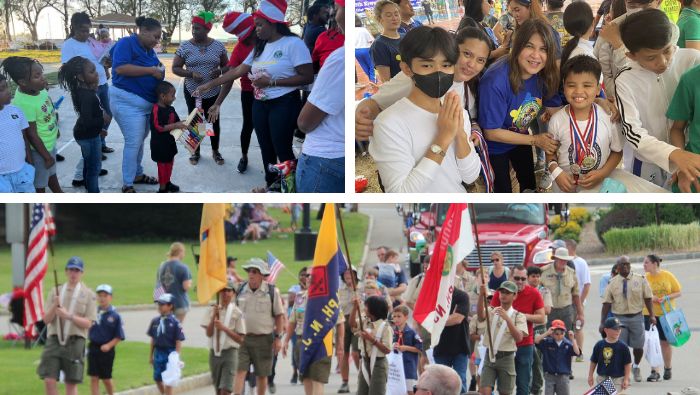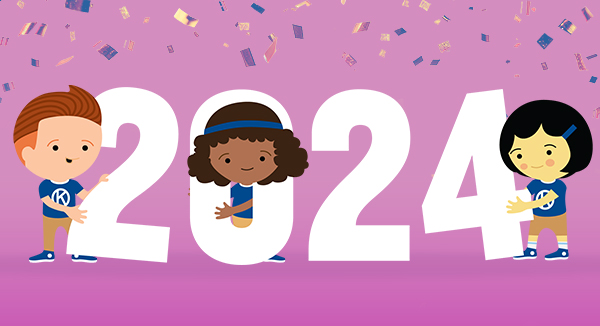
2025 Signature Project Contest Group II finalists announced
Over 500 clubs around the world submitted entries for the 2025 Kiwanis Signature Project Contest.
By Erin Chandler
The top 20 finalists have been selected for consideration in the 2025 Kiwanis Signature Project Contest — 10 for Group I (clubs with 28 or more members) and 10 for Group II (clubs with 28 or more members). All of the finalists will be recognized at the Kiwanis International convention in Pittsburgh, Pennsylvania, U.S. The gold, silver and bronze winners will be announced during the convention.
This year, 519 Kiwanis clubs submitted projects that serve kids all over the world. Each Kiwanis district selected its nominees. Members of the Kiwanis International Board of Trustees then reviewed the district winners and selected 10 finalists for each of the two groups.
Below, in alphabetical order according to district, are the finalists from Group II.
Kiwanis Reads
Kiwanis Club of Birmingham, Alabama, U.S.
Alabama District
In just four years, the Kiwanis Club of Birmingham’s Kiwanis Reads program has brought books into the schools and homes of 20,000 children. In this literacy program, Kiwanians visit 900 preschools in Birmingham twice a year to read to students and give each one a book to build their own home libraries. Each book contains a Kiwanis bookplate with a QR code that leads to a video of a Kiwanis club member reading the book aloud — an extra tool to help kids in homes where there might not be an adult available to read in English. This year, Kiwanis Reads received a club grant from the Kiwanis Children’s Fund; expanded into 10 new schools, allowing them to serve 300 more students; and partnered with the Jefferson County Sheriff’s Office to restart the Books Not Bullets program, providing books for police officers to hand out on patrol. School officials say students are increasing their vocabulary and reading fluency by reading aloud — all while they learn to associate reading with fun.
The American Graffiti Festival and Car Show
Kiwanis Club of North Modesto, California, U.S.
California-Nevada-Hawaii District
Every summer for 25 years, the Kiwanis Club of North Modesto has held a classic car show to celebrate the “American Graffiti” culture of the 1950s and ’60s, as depicted in George Lucas’s 1973 film of the same name. The participants with their classic vehicles, like the spectators who come to see them, may be from the local community or as far away as Europe and Australia. In 2024, some 25,000 attendees enjoyed the parade of vehicles through the heart of Modesto, live entertainment, food, merchandise, craft vendors and nostalgia. The event has become such a summer highlight that the City of Modesto now designates June as Graffiti Month. The American Graffiti Festival and Car Show raises an average of US$300,000 each year, which supports 20 college scholarships and over 50 nonprofit organizations that benefit children and the community.
Ferry Health and Dental Fair
Kiwanis Club of West St. Andrew, Jamaica
Eastern Canada and the Caribbean District
Not even a tropical storm can stop the Kiwanis Club of West St. Andrew’s Ferry Health and Dental Fair. The Ferry community suffers from high poverty and unemployment levels, a lack of running water and the absence of any health center or dental care provider. With help from Jamaica’s Ministry of Health and Wellness, as well as partner organizations that provide equipment, volunteer medical professionals and more, the Kiwanis Club of West St. Andrew stepped in. Their Health and Dental Fair provides free treatments, screenings — including blood pressure checks, diabetes testing, and HIV/STI testing and counseling — dental cleanings, nutritional counseling and vitamin distribution. Patients are also provided with three months of any prescribed medication free of cost. In 2024, 67 medical professionals worked through the rains of Tropical Storm Raphael to treat more than 3,500 patients over the course of the three-day fair. The effort and dedication have even resulted in 12 new Kiwanis members.
KIWANIS SHOW
Kiwanis Club of Harlowton, Montana, U.S.
Montana District
“How do we keep the old community center open?” is the question at the heart of many a classic movie. The Kiwanis Club of Harlowton knows the answer: Put on a show! As the only space in town large enough for special functions like Kiwanis and youth organization meetings, weddings, funerals, blood drives and more, the Kiwanis Youth Center plays a vital role in its community. For 72 years, the club has paid for upkeep of the facility with an annual community variety show, with acts spanning generations. The whole club gets involved, either as performers or crew, while Builders Club and Key Club members sell concessions to raise funds for their projects. Hundreds attend this beloved local tradition every year, including other Montana Kiwanis clubs that travel many miles to enjoy the fun and camaraderie with their fellow Kiwanians. The Harlowton club has even gained 77 new members because of the Kiwanis Show.
Wonder Spelen
Kiwanis Club of Pella, Iowa, U.S.
Nebraska-Iowa District
Before the Kiwanis Club of Pella built the Wonder Spelen playground, over 75 children with disabilities living in the Pella area had to travel an hour for a place to play. Now they can have fun with friends of all abilities — in a park that features an accessible parking lot and restroom, inclusive playground equipment, a sensory garden and a safety fence. The beautiful, Kiwanis-blue playground also highlights the community’s Dutch heritage (“spelen” is Dutch for “recreation” or “to play”) with features like a windmill top on one of the structures. Wonder Spelen has become so popular in the community that it will expand this summer. It has also raised awareness of Kiwanis, reigniting club activity in several neighboring communities.
“Stuff the Strand” Food Drive
Kiwanis Club of Plattsburgh, New York, U.S.
New York District
In 2022, the Kiwanis Club of Plattsburgh Noon had a dramatic idea: fill each of the 901 seats at the local Strand Theatre with three pounds of food, baby formula and diapers to help people in northernmost New York who were experiencing food insecurity. They exceeded their goal that year, bringing in over 3,000 pounds of food. The project has grown every year since. In 2024, the Stuff the Strand drive collected more than 20 pounds of food and baby products per seat, for a total of more than nine tons — enough to feed around 1,200 people. The club also sells seat sponsorships for monetary donations to the Joint Council for Economic Opportunity of Clinton and Franklin Counties Inc. (JCEO) or to purchase more food and supply donations. Prizes go to the top corporate donor, nonprofit donor and youth-based donor. All donations are distributed through the JCEO and the Plattsburgh Interfaith Food Shelf.
Transforming Lives Through the Gift of Mobility
Kiwanis Club of Eastern Antipolo, Rizal, Philippines
Philippine Luzon District
For the past 12 years, the Kiwanis Club of Eastern Antipolo has provided free and low-cost wheelchairs to people of all ages in their community who experience mobility issues. Wheelchairs are essential for many to avoid pain and discomfort, live independent lives and engage with their communities — but they can be difficult to obtain for those with lower incomes or in areas where access to healthcare is limited. So far, the club has positively impacted the lives of 800 people through this project. In doing so, members not only improve individuals’ quality of life, but the community solidarity that brings together donors, volunteers and local organizations to support and get to know their neighbors in need.
The B.E.D. (Because Everyone Deserves) Project
Kiwanis Club of the Colorado River, Bullhead City, Arizona, U.S.
Southwest District
The B.E.D. Project is a new undertaking for the Kiwanis Club of the Colorado River, Bullhead City, but one with a strong principle behind it. In the words of the project’s chairman, Derrick Voss: “Our goal is that no kid has to sleep on the floor. Period.” Research shows that kids who have their own beds sleep better, leading to improved health and ability to learn. That’s why the Kiwanians are stepping in to host four annual build days, meeting the overwhelming need for beds among area youth from 3 to 17 years old. The community has responded in a big way. Businesses have provided discounted mattresses, storage space, promotion, sponsorships and grants — along with expert help and volunteers. On the most recent build day, over 80 club members and people from other local organizations, including the Kiwanis Club of the Colorado River Morning, came together to cut, stain and assemble 50 beds.
Kiwanis Fasnachtsstubete (Kiwanis Carnival Celebration)
Kiwanis Club of Basel Spalen, Switzerland
Switzerland-Liechtenstein District
For the past three years, the Kiwanis Club of Basel Spalen has put its own spin on a local tradition for a good cause. The club hosts its own Kiwanis Fasnachtsstubete, or Carnival celebration, prior to the larger Basler Fasnacht (Basel Carnival). In 2024, 300 people attended the Kiwanis event, which featured traditions like entertainers in costumes with elaborately crafted masks, Schnitzelbänken (comedic rhyming verses), drummers and fife formations. The CHF135,000 raised during the Fasnachtsstubete was divided among four nonprofit organizations: Give a Chance, which builds and renovates school buildings in Cameroon; Fachstelle Kindsverlust, which supports families following the death of a child; Matumaini, which supports a children’s home in Kenya; and Das Frauenhaus beider Basel, which supports families escaping domestic violence.
Annual Kiwanis Kar Derby
Kiwanis Club of Brandon, Manitoba, Canada
Western Canada District
For the past 35 years, residents of Brandon, Manitoba, have come together to cheer on their kids in the Kiwanis Kar Derby. Some of the motorless, handmade “soap box” cars in the race have been passed down within families or sponsoring companies for generations — but the club also often supplies cars to children who cannot afford them or who don’t have an available adult to help build them. Around 300 people attended the most recent Derby. Ray’s Fireplace barbecues for the crowd, neighbors give up their yards for parking and soldiers from the nearby army base help move equipment. The event raises an average of CA$13,900 each year, which goes right back into the community. New and old club members love to see the work they do come to fruition — and to see the smiles on kids’ faces as they speed downhill.


